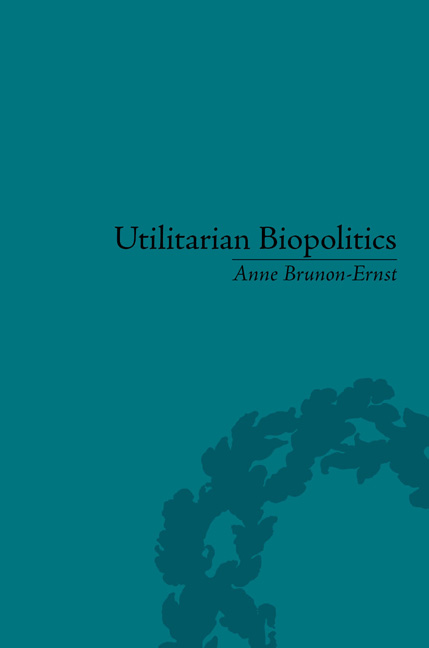Book contents
- Frontmatter
- CONTENTS
- Acknowledgements
- General Introduction
- Part I Biopolitics of Interests Introduction: From Interest to Norms
- 1 Biopolitical Pleasure
- 2 Biopolitical Pain
- Part II Utilitarian Conduct of Conduct Introduction: Legal Norms, Extra-Legal Norms and Utilitarian Conduct
- Part III The Biopolitical Expert Introduction: The Moralist and the Economist
- Epilogue: (De)Constructing Biopolitics
- Notes
- Works Cited
- Index
1 - Biopolitical Pleasure
from Part I - Biopolitics of Interests Introduction: From Interest to Norms
- Frontmatter
- CONTENTS
- Acknowledgements
- General Introduction
- Part I Biopolitics of Interests Introduction: From Interest to Norms
- 1 Biopolitical Pleasure
- 2 Biopolitical Pain
- Part II Utilitarian Conduct of Conduct Introduction: Legal Norms, Extra-Legal Norms and Utilitarian Conduct
- Part III The Biopolitical Expert Introduction: The Moralist and the Economist
- Epilogue: (De)Constructing Biopolitics
- Notes
- Works Cited
- Index
Summary
[A] warning which, for the sake of the reader as well as for the sake of the writer, it is absolutely necessary to give is – that, unless the regard for human happiness has such an influence over his mind as, in pursuit of that object, to enable and force it to endure from beginning to end the extremity of disgust – disgust in its most repulsive form – he would do well to close the book at this very place, and not suffer his eyes to behold another syllable.
Introduction
‘Biopolitical pleasure’ is the phrase used in this chapter to describe how pleasure operates in the biopolitical era. The phrase can be understood to mean either the way biopolitical mechanisms control sexual behaviour, or the strategies of resistance developed by individuals and groups to counter attempts to manage their bodies. Foucault explores both meanings in his writings on sexuality. He first deconstructs the way bodies, through discourse and dispositif, are modelled to maximize productive aims in a biopolitical era. He then explores how individuals could fight back against biopolitical assaults by reclaiming their bodies through unmapped pleasures. Bentham's writings prefigure Foucaultian descriptions of and resistance to discourses on sex. By deconstructing legal discourses on sexual offences, he shows how pleasure should circulate in a State based on the rules of utility. I will argue that Foucault's ‘pleasures’, understood as resistance, are akin to Bentham's utilitarian sex.
- Type
- Chapter
- Information
- Utilitarian BiopoliticsBentham, Foucault and Modern Power, pp. 11 - 30Publisher: Pickering & ChattoFirst published in: 2014



